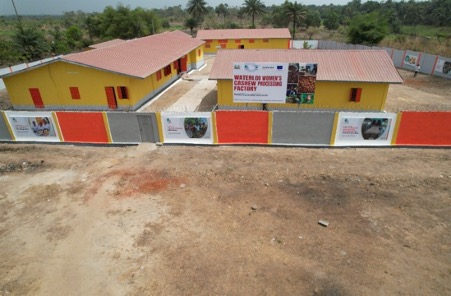The European Union (EU), in collaboration with Solidaridad West Africa and partners, has commissioned the first state-of-the-art cashew processing factory in Sierra Leone.
Constructed with funding from the EU under the Boosting Agriculture and Food Security Project, the factory provides a safe and hygienic environment for cashew processing. It employs over 300 women and youths from the Waterloo Cashew Processors and Sellers Association.
The Newton, Sierra Leone factory will be commissioned on Tuesday, March 26th, 2024. It is estimated to process over 800 kilograms of raw cashew nuts daily and about 200 metric tonnes annually. This increase in production is expected to boost revenue for cashew farmers and processors and enhance the country’s cashew value chain.
Moreover, the factory is upgradeable, allowing its capacity to be increased with additional equipment to enhance production further.
Andrew Kojo Morrison, Country Representative for Solidaridad in Sierra Leone, emphasised that the factory will enable cashew farmers and women processors to meet local and international standards over time.
“With the establishment of the cashew processing factory, the women processors within the Waterloo enclave can now transition from the old processing methods to a more hygienic environment, marking a crucial step towards a sustainable cashew value chain in Sierra Leone,” Andrew stated.
Additionally, the facility will create direct linkages for farmers to sell their raw cashew nuts to processors.
The event also marked the official closeout of the Boosting Agriculture and Food Security Project (cashew, cocoa, coffee), which was implemented by Solidaridad West Africa and Cotton Tree Foundation in collaboration with the Ministry of Agriculture and Food Security, the National Authorizing Organization, and other development partners from July 2019 to March 2024.
The project aims to enhance cashew, cocoa, and coffee (CCC) production and rural incomes through tree crop diversification, agroforestry promotion, and trade and value-addition support.
Key results and achievement
Under the project, Solidaridad West Africa empowered 7,818 smallholder farmers across 12 districts to adopt best agricultural practices, leading to increased production and 300 cashew processors.
These farmers also received extension services and planted improved varieties of cashew, coffee, and cocoa seedlings on 5,182 hectares: cocoa 610ha, cashew 4,441ha, and coffee 131ha.
Additionally, the project established over 200 Farmer Field Schools across Sierra Leone to train smallholder farmers in farm management practices and also created 280 Village Savings and Loans Associations (VSLA) to ensure smallholder farmers have access to finances.
Through the project, Solidaridad has enhanced the capacity of the Ministry of Agriculture and Food Security staff nationwide in policy development, agronomic best practices, and climate-smart solutions. The project supported the design, printing and distribution of cocoa, coffee, and cashew policies, which provided a roadmap to enhance value chains in the tree crop sector.
Building upon the established CCC policy, Solidaridad crafted condensed (abridged) versions tailored for easy comprehension and utilisation by stakeholders, particularly MAFS block extension specialists.
Solidaridad’s efforts have facilitated extensive awareness of the CCC policies throughout the country through workshops, television and radio broadcasts, and radio jingles broadcast in nine local languages.
Solidaridad enhanced the capacity of 13 national NGOs and 3 CBOs engaged in project implementation at the district level through training, coaching, and mentoring.
Many women and youths now own tree crop farms nationwide through the project.
